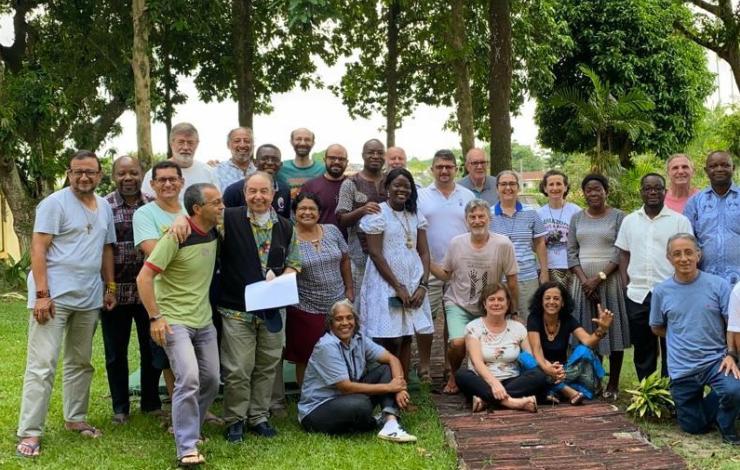Making a Common Cause with the Poor and with the Common Home.

About thirty members of the Comboni Family (Lay, Secular, Religious, men and women, from Africa, America and Europe), met from July 27 to August 3, 2022, in Belém, capital of Pará, Brazil, on the occasion of the X Pan-Amazonian Social Forum (X FOSPA) and the Comboni Meeting on Integral Ecology. Here the Letter they sent
to the Comboni Family.
We opened our ears, hearts and minds to the groans of Mother Earth, of the Amazonian peoples and of the communities we work with, who cry out for the complete regeneration of the daughters and sons of the God of Life (cf. Rom 8, 19-23), present throughout all of Creation. We did this in continuity with the long journey of the Comboni Forums and the mapping of social ministries in our Comboni Family and mission.
We are inspired by the spirituality of native peoples and their strong interconnection with the primary elements of the cosmos: water, rivers, air, forests, land and all beings. Through them, Jesus of Nazareth continues to invite us to “contemplate the birds of the sky and the lilies of the field” (Cf. Mt 6, 26-28) in order to learn and assume together the Bien Vivir (Good Living).
Through attentive, respectful and compassionate Listening to the reality of many peoples:
- We see that the climatic, socio-environmental and political crisis – derived from the dominant and unsustainable economic model, which separates, excludes and kills – seriously endangers human survival and the full life of all Creation, in the territories where we live our vocation and mission at the service of the Kingdom. It is the indigenous peoples, traditional communities, women and young people who still nourish hope, in their resistance, in defense of the Amazon!
- We understand that the gravity of the situation urgently demands that the Church and our Institutes initiate processes of ecological conversion.
We feel it is necessary:
- to review and unlearn many of our concepts and experiences in relation to God and Nature, the relationship among men and women, about inculturation, pastoral practices and liturgy;
- to integrate in our missionary activities the defense of the bodies of those who fight for respect for the environment and of the territories where we are present;
- to cultivate and share eco-spirituality, biblical re-readings and the link between faith and life;
- to adopt a missionary methodology that allows us to have a greater connection and an effective immersion in the values, languages, cultures and sacredness of the peoples and territories with which we interact;
- to review and correct, in our projects and structures, styles of life and consumption, often incompatible with ecological and evangelical sobriety;
- to invest in basic and continuous training that integrate, in theory and in practice, the principles of Integral Ecology;
- to inform and encourage the local Churches and our Comboni Family about events, means and processes that help us to assume and deepen the experience of synodality and social ministeriality in an ecological perspective;
- to strengthen solidarity, participation, mutual care and networking with indigenous peoples, lay people, congregations, social movements and inter-ecclesial and extra-ecclesial bodies.
- We propose to the coordinators of our Institutes, to the councils of the circumscriptions of all continents, to sectorial leaders and to all the members of our Comboni Family:
– adopting, as a common inspiration, the Comboni Pact for the Common Home and, as a transversal axis of all our missionary activity and presence, Integral Ecology;
– promoting the permanent sharing of reflections, lessons learned and practices among the members of the Comboni Family;
– exchanging personnel among communities and circumscriptions that operate in the same territory;
– qualifying our training processes with research, sharing of methodologies for intervention and social transformation and the definition and the theoretical-practical integration of Integral Ecology in line with Laudato Si’ and Querida Amazonia by Pope Francis;
– participating in the discussion and elaboration of pastoral plans in dioceses and parishes that assume the principles of Integral Ecology;
– promoting our qualification and participation in the field of advocacy and political decision in defense of the Common Home;
– supporting and investing in the mechanisms and practices of inclusive economy;
– welcoming and defending people at risk or threatened because of their struggles.
- We assume, as participants in this Comboni Family Encounter and in this rich experience of listening, the commitment to:
▪ publicize and support the Pan-Amazonian Declaration of Belém, which integrates the Knowledge and Feelings shared in the X Pan-Amazonian Social Forum (X FOSPA);
▪ continue the reflection and sharing of insights that emerged during these days of meetings;
▪ translate and live, in the different contexts of our mission, the charismatic inspiration of Comboni (Regenerate Africa with Africa) and the slogan “Amazona-te!”, which had a strong repercussion among us in these days, always respecting and promoting the protagonism of the traditional peoples.
- We entrust all this path that we want to travel to the intercession and protection of the Martyrs of the Amazon who encourage us to radical witness and fidelity in our following of Jesus of Nazareth and in living out our charism.
From the flow of life on the banks of the Guamá River, in Belém do Pará, August 3, 2022.



